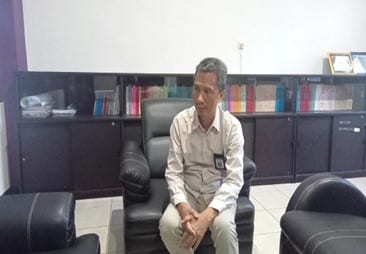Yogyakarta, Jubi – The Constitutional Court has, in fact, revoked in 2007 the article used by the panel of judges of the Jayapura District Court to sentence Viktor Yeimo, the international spokesperson of the West Papua National Committe (KPNB), to 8 months in prison. Viktor Yeimo’s lawyer Latifah Anum Siregar revealed this on Saturday, May 6, 2023, a day after the conviction.
“The panel of judges, in their ruling on Friday, found Viktor Yeimo to have violated Article 155 of paragraph (1) of the Criminal Code. However, the Constitutional Court has declared Article 155 to no longer have any legal force,” said Siregar.
According to Siregar, the Constitutional Court’s Decision No. 6/PUU-V/2007, which was read during the Plenary Session on July 17, 2007, clearly states that Article 154 and Article 155 of the Criminal Code are inconsistent with the 1945 Constitution. The decision also declares that these articles have no legal force. “The decision explicitly declares that Article 154 and Article 155 of the Criminal Code are unconstitutional,” Siregar said.
After reading the verdict, the panel of judges led by chief judge Mathius and consisting of member judges Andi Asmuruf and Linn Carol Hamadi, ordered Viktor Yeimo to remain in detention. However, Siregar stated that this order was null and void.
“The detention was founded upon the verdict that found Viktor Yeimo guilty. Nonetheless, he was convicted based on an article that has been invalidated by the Constitutional Court. Hence, we argue that Viktor Yeimo’s confinement, which started after the verdict was read, is not legitimate,” she said.
She further urged the judges of the Jayapura District Court to abide by the Constitutional Court’s decision that invalidated Article 155 of the Criminal Code. She stressed that Article 155 should no longer be included in any indictments, prosecutions, or court decisions.
Siregar pointed out that the Constitutional Court’s Decision has explicitly stated that Articles 154 and 155 of the Criminal Code were abolished due to their excessive restriction on freedom of expression, which contradicts Articles 28 and 28E Paragraph (2) and Paragraph (3) of the 1945 Constitution. These articles were revoked because they were too often used to criminalize the articulation of one’s views.
In the treason case, Viktor Yeimo was alleged for his involvement in the anti-racism protest in Jayapura on August 19 and 29, 2019, which condemned the racist remarks directed at Papuan students at the Kamasan III Student Dormitory in Surabaya on August 16, 2019.
Viktor Yeimo faced two indictments in his case. The first indictment accused him of committing treason, instructing others to commit, and participating in it as outlined in Article 106 in conjunction with Article 55 paragraph (1) of the Criminal Code. The second indictment accused Yeimo of conspiring to commit treason, as stipulated in Article 110 paragraph (1) of the Criminal Code.
Yeimo faces two more charges in addition to the previous two indictments. In the third indictment, he is accused of the offense of inciting, ordering, or participating in treason by providing assistance or opportunities, according to Article 110 paragraph (2) of the Criminal Code. The fourth indictment alleges that Yeimo incited others through oral or written means to commit a criminal act, engage in violence against public officials, or disobey the law or official orders, which violates Article 160 of the Criminal Code in conjunction with Article 55 paragraph (1) of the Criminal Code.
On April 27, 2023, the public prosecutor found Viktor Yeimo guilty for the offense charged in the first count of Article 106 in conjunction with Article 55 paragraph (1) of the Criminal Code. The prosecutor sought a 3-year imprisonment sentence for Viktor Yeimo.
In the verdict read out on Friday, the judges declared the first, second, third, and fourth charges against Viktor Yeimo could not be proven. However, they found Yeimo guilty of breaking Article 155 paragraph (1) of the Criminal Code, and sentenced Yeimo to 8 months of imprisonment.
According to Siregar, the Panel of Judges’ decision went beyond the Public Prosecutor’s request, which is called Ultra Petita. Siregar argued that even if the judges wanted to sentence Yeimo based on an article not mentioned in the prosecutor’s charges, the article used to convict the defendant should still refer to the one in the prosecutor’s indictment. However, in Yeimo’s case, the judges sentenced him based on an article not included in the prosecutor’s indictment, which is now revoked by the Constitutional Court. Siregar pointed out that this verdict punished Yeimo with an article that has been declared invalid by the Constitutional Court.
According to her, the judges’ decision went beyond what was requested by the public prosecutor, which is known as “Ultra Petita.” Siregar argued that even if the judges wanted to sentence Yeimo based on an article not mentioned in the prosecutor’s charges, the article used to convict the defendant should at least correspond to the article in the prosecutor’s indictment.
Siregar said the Coalition for Law Enforcement and Human Rights for Papua is currently exploring different options and legal actions that can be taken in response to the decision made by the judges of the Jayapura District Court. (*)











